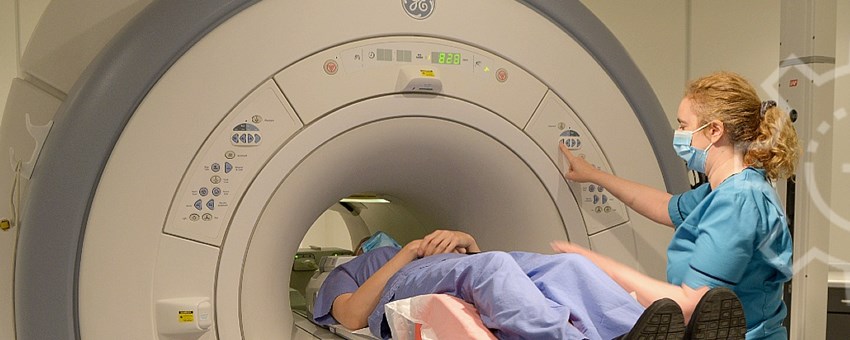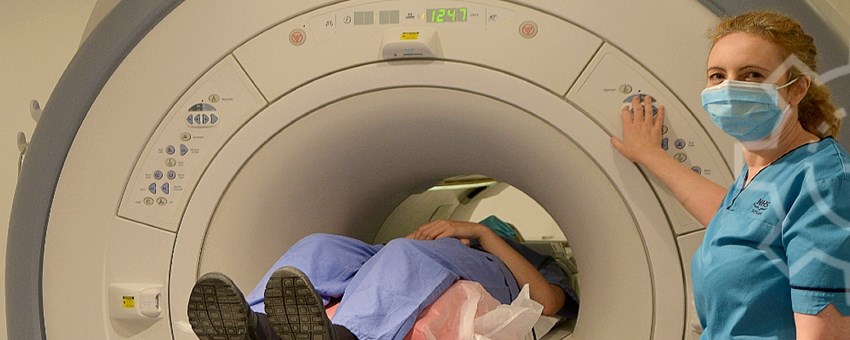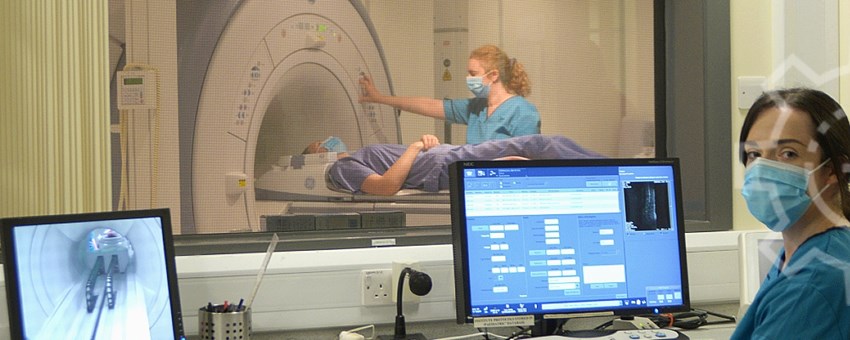MRI Scanner
The Beatson West of Scotland Cancer Centre has two MRI scanners, situated on Level 0. The hospital also has access to a scanner at Gartnavel General Hospital. Your appointment will be made on the scanner with the shortest waiting time.
On the day of your appointment, please ensure you arrive in plenty of time. You may have to follow some preparation instructions before your scan. You will be given more information about this.
Your scan will take between 20 minutes and an hour. If you arrive late you may have to wait until after someone else has had their scan. This could result in a long wait.
An MRI scanner is a short, wide tube, which uses a strong magnet, radio waves and an advanced computer. It produces clear pictures of your body. It is operated by Radiographers.
The scan can take from 20 minutes to an hour.
You should expect to be in the department for up to 1 hour for one scan. If you are having more than 1 body part scanned, this may take longer.
You should receive an appointment letter through the post or a telephone call with your appointment information.
Please read any information that comes with your appointment carefully. This will be on the reverse side of your appointment details. Ensure you take note of which hospital your scan will take place.
Occasionally you may be given fasting instructions. If you aren’t given these then please eat, drink and take any medication as usual. If fasting, continue to take medication but with small sips of water only.
We are unable to arrange hospital transport. If you need transport you should contact your Consultant at the Beatson or their secretary.
Please wear cotton underwear.
Some clothing contains metallic fibres such as exercise, stretch and spandex clothing. These may not be suitable to wear in an MRI Scanner. The staff may ask you to change into more suitable clothing or a hospital gown.
Please report to the reception stated on your appointment letter. Take a seat in the waiting area if no receptionist is present.
Your appointment will be 10-20 minutes before your scan to give us time to get you ready.
You may have to follow special preparation instructions before your scan. We may therefore ask you to attend a little earlier. This will be explained to you.
Safety checklist
You will be asked to complete a safety checklist to make sure it is safe for you to go into a strong magnetic field. If you have difficulty reading or understanding any of the questions, a member of staff will help you. Once you have completed this form, your Radiographer or assistant will ask your name, date of birth, address and check all your details are correct.
On occasion your Radiographer may have to telephone another department, check records or organise an X-ray to ensure it is safe for you to have your scan. If you have any questions regarding any surgery you may have had, it is better to phone ahead before your appointment. This allows your Radiographers to get any additional information before your appointment.
What happens next?
You will be given a full explanation of the scan. This will include how long it will take, your position on the table, breathing instructions and details of any injections. You will then be asked to sign the checklist.
Depending on the area to be scanned, you may be shown into a cubicle and asked to change into either a hospital gown or theatre scrubs. You will be asked to remove your watch, keys, coins, credit cards and jewellery etc. You may prefer to leave these objects at home but a locker will be provided for you. You will not be allowed to take anything magnetic or metal into the scan room with you. Please do not wear mascara or eyeliner and do not use hairspray.
You may also be given an injection prior to the scan. If so, a plastic tube (cannula) will be put into one of your veins in your arm or hand. It is usually left in place until the scan is complete. If you already have a cannula in, this will be used.
Your Radiographer or assistant will probably check once more that no magnetic objects are on your person before you are taken into the scan room.
You will be asked to lie on a table, which can feel quite hard and you may have to lie quite flat on your back. Your Radiographer will try to get you as comfortable as possible. You may have your head on a pillow or it may be in a special rest.
Usually a ‘coil’ (piece of equipment that gives us the images) is placed around or lightly on top of the body part to be scanned. If you have a plastic tube in place for an injection, you may have this connected to a special injector in the scanning room.
You will be given a buzzer to hold in case you wish to stop the scan at any time. The scanner is noisy, so you may be given some headphones or earplugs to protect your ears. The table is moved into the scanner so that the part of your body we are imaging is the middle of the scanner. If we are looking at an area between your tummy and feet we can move you into the scanner feet-first. If we are scanning above your tummy you may have to go into the scanner head-first.
Your Radiographer will make sure you are OK in the scanner before leaving the room to begin the scan.
The scanner makes a lot of noise (sometimes a bit like a pneumatic drill and other times like a lorry reversing). It is important that you lie as still as possible, especially when this noise is on. Your Radiographer may speak to you during the scan to make sure you are OK. They can see you throughout the examination but may not always be able to hear you. If you wish to stop the scan or speak to your Radiographer, you can press the buzzer provided.
You will normally be given music to listen to. However, if you are having your tummy area scanned, there may be some breathing instructions and this may not be possible.
You may be asked to breathe in or breathe out and to hold your breath. Sometimes this varies but your Radiographer will advise you of this before your scan.
If you are given a contrast agent or 'dye'
You may be given an injection of a contrast agent or ‘dye’ during the scan. It shows up in the blood supply and can give the Radiologist more information from the
examination. The Radiologist is an expert in reading the MRI scans and will decide if an injection is needed in your case.
Your Radiographer may come into the room to give the contrast agent or it may be given by a special injector in the scan room. This depends on the examination you are having.
You will be able to drive/work as usual after the injection.
Your Radiographer or assistant will move the table out from the scanner and make sure you are OK.
They will remove any plastic tube and pieces of equipment from around you. You may feel dizzy when you sit up. This is usually because you have been lying so flat. You will then be shown into the changing cubicle. You can change and leave the department when you are ready.
You will not usually need to speak to anyone before you leave.
The Radiologist will look at the scans and the results will then be sent to your Consultant.
If you suffer from severe claustrophobia you may wish to speak to a Radiographer or visit the department before your appointment to discuss your concerns. You should call the number on your letter to arrange this.
Some people choose to visit their GP before their scan. The GP may prescribe a mild sedative to help with anxiety.
Due to the strong magnetic field, not everyone is suitable for an MRI scan. If you have or have had any of the following, please call the number on your appointment letter as soon as possible:
- Cardiac Pacemaker
- Aneurysm Clip
- Artificial Heart Valve
- Ear (cochlear) implant
-
Skin patches including glucose monitors that will have to be removed for the scan
-
Metal fragments in eyes, head or body or any procedure to remove metal
-
Metallic Implant
-
Please also phone if you are pregnant or breast-feeding at time of appointment.
Useful Links
www.nhs.uk/conditions/mri-scan/what-happens/
www.radiologyinfo.org
www.goingfora.com



